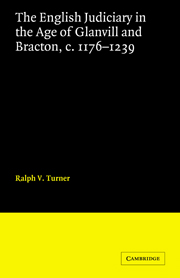Book contents
- Frontmatter
- Contents
- Acknowledgements
- Abbreviations
- 1 THE REPUTATION OF THE ROYAL JUSTICES
- 2 GLANVILL AND HIS COLLEAGUES, c. 1176–89
- 3 THE ORIGINS OF A PROFESSIONAL JUDICIARY IN THE REIGN OF RICHARD I
- 4 KING JOHN'S CORPS OF JUSTICES
- 5 PATTISHALL, RALEIGH AND THEIR COLLEAGUES
- 6 THE WORK OF THE JUSTICES
- Conclusion: The judges and their critics
- Appendix: Royal justices, c. 1176–1239
- Manuscript sources
- Index
- CAMBRIDGE STUDIES IN ENGLISH LEGAL HISTORY
4 - KING JOHN'S CORPS OF JUSTICES
Published online by Cambridge University Press: 07 October 2011
- Frontmatter
- Contents
- Acknowledgements
- Abbreviations
- 1 THE REPUTATION OF THE ROYAL JUSTICES
- 2 GLANVILL AND HIS COLLEAGUES, c. 1176–89
- 3 THE ORIGINS OF A PROFESSIONAL JUDICIARY IN THE REIGN OF RICHARD I
- 4 KING JOHN'S CORPS OF JUSTICES
- 5 PATTISHALL, RALEIGH AND THEIR COLLEAGUES
- 6 THE WORK OF THE JUSTICES
- Conclusion: The judges and their critics
- Appendix: Royal justices, c. 1176–1239
- Manuscript sources
- Index
- CAMBRIDGE STUDIES IN ENGLISH LEGAL HISTORY
Summary
THE COURTS OF KING JOHN AND THEIR JUSTICES
With the creation of the court coram rege under King John, a new branch of royal justice takes its place alongside the Bench at Westminster and the periodic eyres. The traditional view of this has been to regard it as simply part of a centuries-long process of professionalization and specialization, as distinct departments broke away from the old undifferentiated curia regis. The growth of professional staffs for the work of justice supports such a view. Yet the appearance of two courts which were virtually duplicates of one another in their work suggests that something else was at work: two different tendencies in medieval English government were in tension. John's creation of his own court can be seen as resistance to the tendency of offices to ‘go out of court’ and as a royal effort to preserve ‘familiar’ or ‘household’ government which would be more responsive to the king's will.
Certainly the process of specialization and professionalization is easy enough to see if we look at the royal judges serving King John. We find seventeen men who served so regularly on the bench at Westminster, with the court coram rege, or on eyres to the counties that they were clearly specialists in the sphere of justice.
- Type
- Chapter
- Information
- Publisher: Cambridge University PressPrint publication year: 1985

